人教版英语九年级下册语法总结1
人教版初三英语知识点总结

人教版初三英语知识点总结一、语法重点1. 时态- 一般现在时:表示经常发生的动作或状态。
- 一般过去时:表示过去发生的动作或状态。
- 现在进行时:表示正在进行的动作。
- 过去进行时:表示过去某一时刻正在进行的动作。
- 一般将来时:表示将来会发生的动作。
- 现在完成时:表示过去发生的动作对现在的影响或结果。
- 过去完成时:表示在过去某一动作之前已经完成的另一动作。
2. 语态- 被动语态:表示主语是动作的承受者。
- 一般现在时被动语态:am/is/are + past participle。
- 一般过去时被动语态:was/were + past participle。
- 现在进行时被动语态:am/is/are being + past participle。
- 一般将来时被动语态:will be + past participle。
3. 非谓语动词- 动名词:作为名词使用,表示动作。
- 分词:现在分词(表示正在进行)和过去分词(表示被动或完成)。
- 不定式:to + base form of verb,表示动作的目的、意图或结果。
4. 情态动词- can/could:表示能力或请求。
- may/might:表示可能性。
- must:表示必须或强烈义务。
- should/ought to:表示建议或应当。
5. 句子结构- 简单句:一个主语和一个谓语。
- 并列句:使用并列连词连接两个或多个简单句。
- 复合句:包含一个主句和至少一个从句。
- 定语从句:修饰名词或代词的从句。
- 状语从句:表示时间、地点、原因、条件、结果等。
二、词汇与短语1. 常见词汇- 描述人物特征的形容词:kind, honest, creative, etc.- 描述日常活动的动词短语:clean up, take out, turn off, etc.- 描述情感和情绪的名词:happiness, sadness, anger, etc. - 描述天气的词汇:sunny, rainy, windy, etc.2. 短语搭配- 动词短语搭配:finish doing, stop to do, remember to do, etc.- 形容词与介词的搭配:afraid of, interested in, good at, etc.- 常用口语表达:What's up?, How about…?, It's up to you, etc.三、阅读理解技巧1. 快速阅读(Skimming)- 快速浏览文章,抓住主旨大意。
人教版九年级英语知识点归纳

人教版九年级英语知识点归纳一、语法知识点1. 一般现在时:用于描述经常发生的行为或真相,动词原形加s/es。
2. 一般过去时:用于描述过去发生的动作或状态,动词过去式形式。
3. 现在进行时:用于描述当前正在进行的动作,be动词+动词ing形式。
4. 现在完成时:用于描述过去发生的动作对现在造成的影响,have/has + 过去分词。
5. 一般将来时:用于描述将来的动作,will/shall + 动词原形。
6. 情态动词:can, could, may, might, must, shall, should, will, would等,用于表达能力、可能性、推测、必要性等。
7. 定语从句:用于对名词进行修饰和限制,引导词有关系代词和关系副词。
8. 倒装句:用于强调句子中的某一部分,将助动词或情态动词放在主语之前。
9. 被动语态:用于强调动作的承受者,be动词+过去分词。
10. 状语从句:用于修饰句子中的动作或状态,引导词有时间、原因、条件等。
二、词汇知识点1. 动词短语:由动词和副词、介词构成的短语,如give up,look after, think of等。
2. 同义词和反义词:指意义相同或相反的词语,如happy和glad、buy和sell等。
3. 词汇拓展:指根据前缀、后缀或词形变化,拓展词汇的能力。
4. 高频词汇:指经常出现在九年级英语课本和考试中的单词,如important, improve, knowledge等。
5. 词义辨析:指对意义相近但用法不同的词进行区分,如listen和hear、borrow和lend等。
三、阅读技巧1. 主旨大意:通过阅读文章的首句、末句和段落标题等,找出文章的主题或中心思想。
2. 查找信息:通过快速阅读或扫读,找出与特定问题或关键词相关的信息。
3. 推理判断:根据文章中的暗示或细节推断出未写明的信息或作者的观点。
4. 阅读策略:如预测题目、通读全文、找关键词等,帮助提高阅读效率和准确性。
人教版九年级英语下知识点
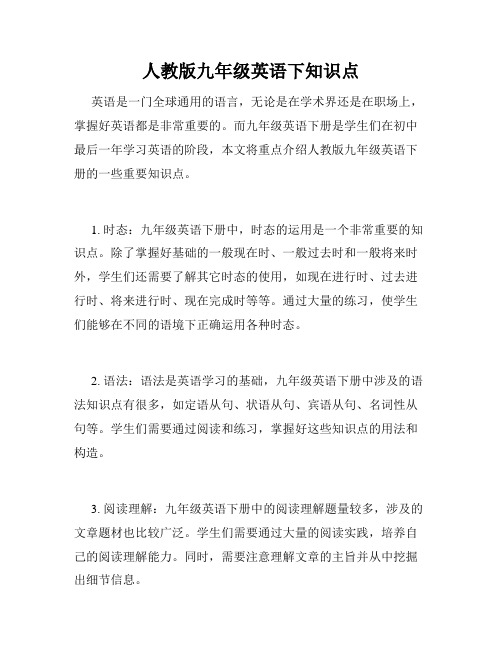
人教版九年级英语下知识点英语是一门全球通用的语言,无论是在学术界还是在职场上,掌握好英语都是非常重要的。
而九年级英语下册是学生们在初中最后一年学习英语的阶段,本文将重点介绍人教版九年级英语下册的一些重要知识点。
1. 时态:九年级英语下册中,时态的运用是一个非常重要的知识点。
除了掌握好基础的一般现在时、一般过去时和一般将来时外,学生们还需要了解其它时态的使用,如现在进行时、过去进行时、将来进行时、现在完成时等等。
通过大量的练习,使学生们能够在不同的语境下正确运用各种时态。
2. 语法:语法是英语学习的基础,九年级英语下册中涉及的语法知识点有很多,如定语从句、状语从句、宾语从句、名词性从句等。
学生们需要通过阅读和练习,掌握好这些知识点的用法和构造。
3. 阅读理解:九年级英语下册中的阅读理解题量较多,涉及的文章题材也比较广泛。
学生们需要通过大量的阅读实践,培养自己的阅读理解能力。
同时,需要注意理解文章的主旨并从中挖掘出细节信息。
4. 写作:写作是英语学习的重要环节之一。
九年级英语下册中,学生们需要掌握一些写作技巧,如叙述性作文、说明性作文和议论性作文等。
在写作中,要注意语法和拼写的准确性,同时也要注重文章的结构和逻辑性。
5. 听力:九年级英语下册中的听力部分要求学生们通过听力材料获取信息并做出相应的回答。
通过大量的听力练习,提高自己的听力理解能力,并学会捕捉关键信息。
6. 背诵:九年级英语下册中,学生们需要背诵一些重要的单词、词组和句型。
通过不断的复习和背诵,扩充自己的词汇量,提高自己的语言表达能力。
总之,九年级英语下册的知识点非常丰富,学生们需要通过不断的学习和练习,掌握好这些知识点。
同时,要注重培养自己的英语思维和应用能力,通过大量的实践提升自己的英语水平。
相信只要努力学习,九年级的学生们一定能够在英语学习中取得好成绩,并为将来更高层次的学习和生活打下坚实的基础。
人教版九年1--4单元语法英语知识总结
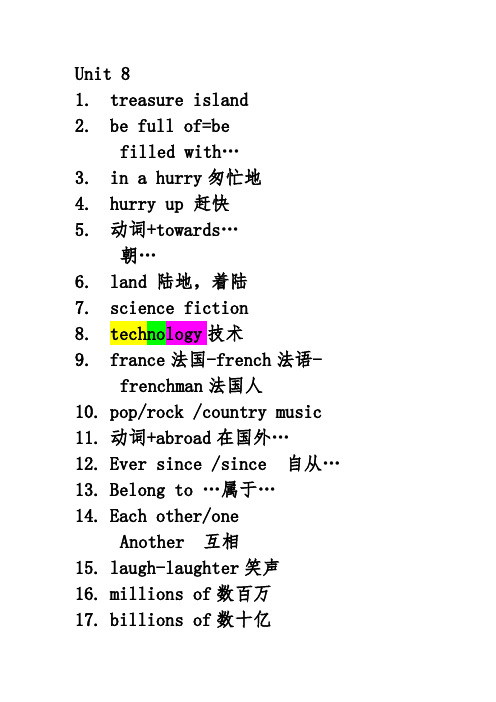
Unit 81.treasure island2.be full of=befilled with…3.in a hurry匆忙地4.hurry up 赶快5.动词+towards…朝…nd 陆地,着陆7.science fiction8.technology技术9.france法国-french法语-frenchman法国人10.pop/rock /country music11.动词+abroad在国外…12.Ever since /since 自从…13.Belong to …属于…14.Each other/oneAnother 互相ugh-laughter笑声lions of数百万17.billions of数十亿18.beauty-beaut iful19.record 唱片、记录keep a record保持记录break a record打破记录20.introduce…to…把…介绍给…21.get the line 接通线路\电话22.a busy line 忙线23.in line with…与…站成一线Unit 91.amusement park2.somewhere/anywhere/everywherenowhere3.invent—invention发明/inventor发明家4.believe-believable-unbelievable5.make a (rapid) progress取得快速进步6.encourage sb to do sth 鼓励某人去做…7. encourage—encouragement(名)8.Make peace with sb 与某人和平相处---peaceful(形容词)9.Tea art 茶艺10.German德国人—Germans—Germany德国11.On the one hand…on the otherHand…31 is full of32.haven’t read 33.Since then34.at least 35.couldn’t waitto drinkI have eaten up37.why not… ed to41.introduce 42. Island43. guns 44.at 45.full46.abroad 47.southern48.fell 49.fans 50 become分数表达法基数词(大于一)/序数词(s)2/5 two fifths6/8 six eighthsUint 10.1.have a yard sale旧物拍卖2.check out 检查查看3.board game 棋类游戏4.junior high school 初中5.clear out 清理丢掉no longer/more=not anymore/longer 不再6.of /on one’s own 属于某人自己的7.part with 放弃交出8.make certain that…确信9.be certain to do sth确信做…10.be certain about…确信某事11.as for 至于12.to be honest/tell the truth讲实话13.for a little while 一会14.truth—truthful诚实的真实的15.se arch for…搜查搜寻…16.what a shame/pity真可惜17.shame—shameful (形容词)18.regard…as…把…当做…19.according to 依据按照20.consider doing sth 思考做…21.consider…as…把…看做…22.23.hold—held 拥有抓住Unit 11.have a conversation with sb与某人进行对话2.aloud/loudly 大声地3.pronunce—pronuncation名发音读音4.patient (1)病人be patient with (2)有耐心的5.express—expression(名)表达6.discover—discovery(名)发现7.take notes 记笔记19.Let /have/make sb do sth—Uint 21,stange—stanger(名)陌生人2.relative(1)亲属(2)相关的3.put on weight –lose weight 增重---减肥4.steal –stole—stolen偷窃y放置安放下蛋lay out 摆开Lay—laid—laidLie存在平躺处于Lie—lay—lain6.tie 领带栓7.play tricks on sb 捉弄某人8.treat…as…把…当做…9.on the eve of…在…前夕10.be on business 出差Do business with sb 与…做生意12.punish—punishment(名)惩罚13.warn sb (not) to do sth14.warn sb against doing sth警告某人(不)做某事Warn sb about sth警告某人关于某事15.end up with…以…结尾16.at present 现在此刻17.warm—warmth(名)温暖18.spread over 蔓延传播19.spread—spread--spread20.宾语从句:1.that引导That不翻译可省略2,if/wether引导翻译是否不可省略方法一,把 is/am/are/was/were放在名词后面Can you tell meWhen your birthday is?Do youknowWhen the bookstore方法二:句子中有did/do/does时,把它们去掉,动词要变成相应形式。
人教版九年级全一册英语Unit1单元语法知识点总结
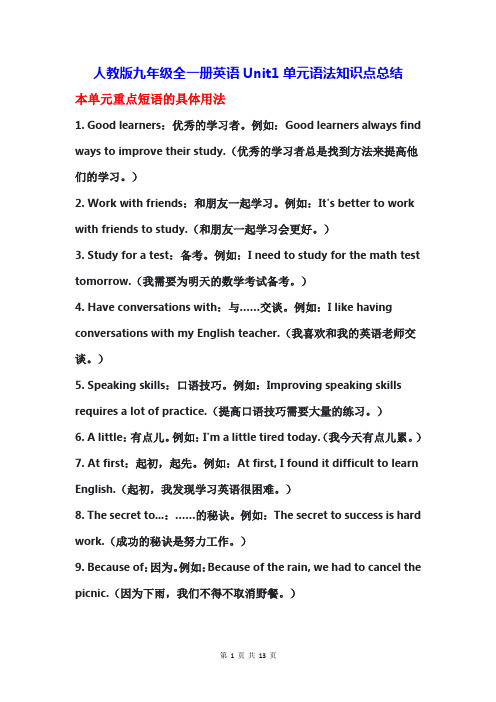
人教版九年级全一册英语Unit1单元语法知识点总结本单元重点短语的具体用法1. Good learners:优秀的学习者。
例如:Good learners always find ways to improve their study.(优秀的学习者总是找到方法来提高他们的学习。
)2. Work with friends:和朋友一起学习。
例如:It's better to work with friends to study.(和朋友一起学习会更好。
)3. Study for a test:备考。
例如:I need to study for the math test tomorrow.(我需要为明天的数学考试备考。
)4. Have conversations with:与……交谈。
例如:I like having conversations with my English teacher.(我喜欢和我的英语老师交谈。
)5. Speaking skills:口语技巧。
例如:Improving speaking skills requires a lot of practice.(提高口语技巧需要大量的练习。
)6. A little:有点儿。
例如:I'm a little tired today.(我今天有点儿累。
)7. At first:起初,起先。
例如:At first, I found it difficult to learn English.(起初,我发现学习英语很困难。
)8. The secret to...:……的秘诀。
例如:The secret to success is hard work.(成功的秘诀是努力工作。
)9. Because of:因为。
例如:Because of the rain, we had to cancel the picnic.(因为下雨,我们不得不取消野餐。
人教版九年级英语知识点

人教版九年级英语知识点一、语法知识点1. 一般现在时一般现在时表示经常性或习惯性的动作、真理、事实、固定安排或时间表等。
一般现在时的肯定句结构为:主语 + 动词原形;否定句结构为:主语 + do not/does not + 动词原形;一般疑问句结构为:Do/Does + 主语 + 动词原形?2. 一般过去时一般过去时表示发生在过去的动作或状态。
一般过去时的肯定句结构为:主语 + 动词过去式;否定句结构为:主语 + did not + 动词原形;一般疑问句结构为:Did + 主语 + 动词原形?3. 一般将来时一般将来时表示将来要发生的动作或存在的状态。
一般将来时的肯定句结构为:主语 + will + 动词原形;否定句结构为:主语 + willnot/won’t + 动词原形;一般疑问句结构为:Will + 主语 + 动词原形?4. 现在进行时现在进行时表示正在进行的动作,常与"now"连用。
现在进行时的肯定句结构为:主语 + am/is/are + 动词ing;否定句结构为:主语 + am not/is not/are not + 动词ing;一般疑问句结构为:Am/Is/Are + 主语 + 动词ing?5. 过去进行时过去进行时表示过去某一时刻或某一段时间内正在进行的动作。
过去进行时的肯定句结构为:主语 + was/were + 动词ing;否定句结构为:主语 + was not/were not + 动词ing;一般疑问句结构为:Was/Were + 主语 + 动词ing?6. 一般现在进行时一般现在进行时表示过去某一时刻或某一段时间内习惯性或经常性进行的动作。
一般现在进行时的肯定句结构为:主语 + am/is/are + 一直现在分词ing;否定句结构为:主语 + am not/is not/are not + 一直现在分词ing;一般疑问句结构为:Am/Is/Are + 主语 + 一直现在分词ing?7. 一般过去进行时一般过去进行时表示过去某一时刻或某一段时间内习惯性或经常性进行的动作。
九年级英语下册知识点归纳

九年级英语下册知识点归纳一、语法知识点1. 时态与语态英语中的时态包括一般现在时、一般过去时、一般将来时等。
同时,还有被动语态的使用,通过改变句子的主语与谓语动词形式来表达动作的执行者与承受者。
2. 比较级与最高级当我们要进行事物或性质的比较时,可以用比较级和最高级来描述。
比较级用于两者之间的比较,最高级用于三者或三者以上的比较。
3. 宾语从句英语中可以使用宾语从句来充当宾语的一部分,从而丰富句子的表达。
宾语从句一般由连词that, whether, if等引导。
4. 状语从句状语从句是句子的一部分,用于修饰句子中的动作或状态。
常见的状语从句有时间状语从句、条件状语从句、原因状语从句、目的状语从句等。
5. 名词性从句名词性从句可以作为句子的主语、宾语或表语等,起到名词的作用。
常见的名词性从句有主语从句、宾语从句、表语从句等。
二、词汇和短语1. 同义词与反义词同义词是指意思相同或相近的词语,可以用来替换或扩展句子的表达。
反义词是指意思相反的词语,用来表达对立或相互排斥的概念。
2. 词根、前缀和后缀英语单词由词根、前缀和后缀构成,通过对这些部分的掌握,可以更好地理解和记忆单词的意思和构成。
3. 常见短语在英语中,短语的使用非常广泛。
比如常见的动词短语、介词短语、形容词短语和副词短语等,都可以帮助我们更准确地表达意思。
三、阅读技巧1. 快速阅读快速阅读是根据文章的结构、关键词和逻辑关系,快速获取文章的主旨和关键信息。
通过训练,可以提高阅读速度和理解能力。
2. 猜词法猜词法是指根据上下文的提示来猜测词义。
通过熟练掌握各种猜词方法,可以更好地理解和记忆生词。
3. 阅读技巧阅读技巧有很多种,比如查字典、标注关键词、大胆推测等。
通过灵活运用这些技巧,可以提高阅读的效率和准确性。
四、写作技巧1. 写作结构写作结构是指文章的整体安排和组织方式。
常见的写作结构有问题解决型、原因和结果型、对比型等。
2. 单词和短语的使用在写作中,适当地使用丰富多样的单词和短语可以提高文章的表达力和吸引力。
人教版九年级英语(全册)重点语法知识点复习梳理

人教版九年级英语(全册)重点语法知识点复习梳理人教版九年级英语重点语法知识点复习梳理一.介词by的用法(Unit-1重点语法)1.意为“在……旁”,“靠近”。
Some are singing and dancing under a big tree. Some are drawing by the lake.有的在大树下唱歌跳舞。
有的在湖边画画儿。
2.意为“不迟于”,“到……时为止”。
Your son will be all right by supper time.你的儿子在晚饭前会好的。
How many English songs had you learned by the end of last term?到上个学期末你们已经学了多少首英语歌曲?3.表示方法、手段,可译作“靠”、“用”、“凭借”、“通过”、“乘坐”等。
The monkey was hanging from the tree by his tail and laughing.猴子用尾巴吊在树上哈哈大笑。
The boy’s father was so thankful that he taug ht Edison how to send messages byrailway telegraph.孩子的父亲是那末的感谢,因而他教爱迪生怎样经由过程铁路电报来转达息。
4.透露表现“逐个”,“逐批”的意思。
One by one they went past the table in the dark.他们一个一个得在黑暗中颠末这张桌子。
5.表示“根据”,“按照”的意思。
What time is it by your watch?你的表几点了?6.和take , hold等动词连用,说明接触身体的某一部分。
I took him by the hand.我拉住了他的手。
7.用于被动句中,表示行为主体,常译作“被”、“由”等。
English is spoken by many people.英语被许多人说。
人教版英语九年级下册语法总结1

人教版英语九年级下册语法1冠词a/an/the/x的辨析1. 不定冠词(1) 不定冠词有两个:a和an。
a用于以辅音音素开头的单词之前,an用于以元音音素开头的单词之前。
当形容词修饰名词时,冠词要放在形容词的前面,这时用a或an取决于这个形容词的读音。
(2) 不定冠词的用法:①用于第一次提到的、不确定的人或物(可数名词)之前;②用于重量或时间等表示单位的名词前面,是“每……”的意思;③表示职业、身份;④用于数字hundred, thousand, million、量词之前;⑤用于一些固定词组中,如:have a rest 休息;make a living 谋生。
例:I read a book every month.我每个月读一本书。
An apple a day keeps the doctor away.每天一个苹果,医生远离我。
注意:有些单词虽然以元音字母开头,但是前面用不定冠词a,如university (大学)。
这是因为u在此发[ ju: ],以辅音音素开头用a。
同样,有些单词虽然以辅音字母开头,但是前面用不定冠词an,如hour。
这是因为h在此不发音,ou发[aʊ]的音,以元音音素开头用an。
2. 定冠词the(1) 一般用法:①用于第二次谈到的人或物。
②用于双方共知的人或物。
③“the + n.单数”可以表示一类人或物。
例:The telephone was invented by Bell.电话是由Bell发明的。
④指世界上独一无二的事物。
(2) 特殊用法:定冠词常用于一些特定词的前面。
助记:沙漠、河流与群山;列岛、海峡与海湾;阶级、党派、国家名;组织、团体和机关;方位、朝代、独一词;会议、文件及报刊;乐器、建筑、海洋群;定冠词帽戴在前。
①用于姓氏复数之前表示夫妇或全家人。
②“the + adj.”表示一类人或物。
如:the young 年轻人。
③用于一些固定词组中:in the evening在晚上;at the time在那时;go to the movies去看电影。
人教版初三英语必背知识点汇总

人教版初三英语必背知识点汇总一、语法知识点汇总1. 时态- 一般现在时:表示经常性、惯性的动作或状态。
- 进行时:表示正在进行的动作。
- 现在完成时:表示已经发生过的动作或经验。
- 一般过去时:表示过去某个时间发生的动作或存在的状态。
- 过去进行时:表示过去某个时间正在进行的动作。
2. 直接引语和间接引语- 直接引语:直接引述别人的原话或思想。
- 间接引语:用自己的话转述别人的原话或思想。
3. 从句- 名词性从句:在句中作主语、宾语、表语或同位语。
- 定语从句:在句中修饰名词或代词。
- 状语从句:在句中作状语。
4. 比较级和最高级- 比较级:表示两者在某一方面的比较。
- 最高级:表示三者或三者以上在某一方面的比较。
二、词汇知识点汇总1. 动词短语- look forward to:期待- give up:放弃- make up:编造,弥补- take off:起飞2. 名词短语- in the future:将来- on the one hand:一方面- on the other hand:另一方面- at the same time:同时3. 形容词和副词- curious:好奇的- anxious:焦虑的- fortunately:幸运地- seriously:认真地三、阅读技巧1. 阅读理解技巧- 注意文章标题和开头,获取大意。
- 通读全文,抓住关键信息。
- 注意文章的结构和组织方式。
- 根据问题定位答案。
- 多做练,提高阅读速度和理解能力。
2. 阅读表达技巧- 注意提问方式,审清题意。
- 结合文章内容,概括出要点。
- 注意文章的时态。
- 使用恰当的连接词和过渡词。
四、写作技巧1. 作文结构- 开头:引入话题,引起读者兴趣。
- 主体:运用合适的语言表达观点和论据。
- 结尾:总结全文,给出自己的看法。
2. 语言运用- 注意语法和词汇的正确性。
- 使用恰当的连词和过渡词。
- 适当使用丰富多样的句式。
人教版九年级英语下册Unit 1知识点总结
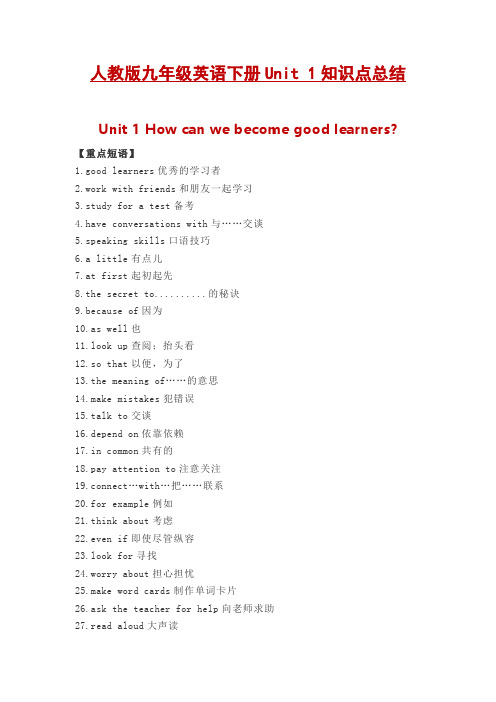
人教版九年级英语下册Unit 1知识点总结Unit 1 How can we become good learners? 【重点短语】1.good learners优秀的学习者2.work with friends和朋友一起学习3.study for a test备考4.have conversations with与……交谈5.speaking skills口语技巧6.a little有点儿7.at first起初起先8.the secret to..........的秘诀9.because of因为10.as well也11.look up查阅;抬头看12.so that以便,为了13.the meaning of……的意思14.make mistakes犯错误15.talk to交谈16.depend on依靠依赖17.in common共有的18.pay attention to注意关注19.connect…with…把……联系20.for example例如21.think about考虑22.even if即使尽管纵容23.look for寻找24.worry about担心担忧25.make word cards制作单词卡片26.ask the teacher for help向老师求助27.read aloud大声读28.spoken English英语口语29.give a report作报告30.word by word一字一字地31.so……that如此……以至于32.fall in love with爱上33.something interesting有趣的事情34.take notes记笔记35.how often多久一次36.a lot of许多37.the ability to do sth.做某事的能力38.learning habits学习习惯39.be interested in对……感兴趣40.get bored感到无聊【重点句型】1.提建议的句子:①What/how about+doing sth.?做…怎么样?如:What/How about going shopping?②Why don't you+do sth.?你为什么不做…?如:Why don't you go shopping?③Why not+do sth.?为什么不做…?如:Why not go shopping?④Let's+do sth.让我们做…吧。
人教版初中英语九年级全册语法知识点汇总.docx
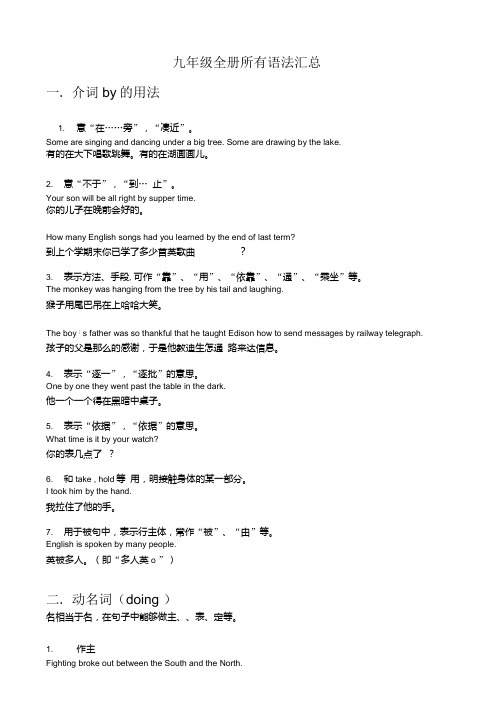
九年级全册所有语法汇总一. 介词by的用法1. 意“在……旁”,“凑近”。
Some are singing and dancing under a big tree. Some are drawing by the lake.有的在大下唱歌跳舞。
有的在湖画画儿。
2. 意“不于”,“到… 止”。
Your son will be all right by supper time.你的儿子在晚前会好的。
How many English songs had you learned by the end of last term?到上个学期末你已学了多少首英歌曲?3. 表示方法、手段,可作“靠”、“用”、“依靠”、“通”、“乘坐”等。
The monkey was hanging from the tree by his tail and laughing.猴子用尾巴吊在上哈哈大笑。
The boy ; s father was so thankful that he taught Edison how to send messages by railway telegraph. 孩子的父是那么的感谢,于是他教迪生怎通路来达信息。
4. 表示“逐一”,“逐批”的意思。
One by one they went past the table in the dark.他一个一个得在黑暗中桌子。
5. 表示“依据”,“依据”的意思。
What time is it by your watch?你的表几点了?6. 和take , hold等用,明接触身体的某一部分。
I took him by the hand.我拉住了他的手。
7. 用于被句中,表示行主体,常作“被”、“由”等。
English is spoken by many people.英被多人。
(即“多人英o ”)二. 动名词(doing )名相当于名,在句子中能够做主、、表、定等。
人教版九年级下册英语知识点总结

人教版九年级下册英语知识点总结
本文档旨在总结人教版九年级下册英语的知识点。
以下是该教
材中的一些重点内容:
1. 基本语法知识
- 时态和语态:包括一般现在时、一般过去时、将来时、被动
语态等基本语法知识。
- 句型结构:了解并应用肯定句、否定句、疑问句等句型结构。
- 从句和复合句:了解并使用名词从句、定语从句、状语从句等。
2. 词汇与语法
- 词汇扩展:掌握并应用新研究的词汇,包括名词、动词、形
容词、副词等。
- 介词短语:了解并正确使用介词,如in、on、at等。
- 连词使用:熟练运用并掌握各种连词,如and、but、so等。
3. 阅读理解技巧
- 理解文章大意:通过阅读短文、对话等,能够理解文章的大
意和基本信息。
- 掌握细节信息:能够从文章中获取细节信息,如人物特征、
地点、时间等。
- 推理和推测:通过上下文和线索,进行推理和推测,理解文
章隐含的意思。
4. 写作技巧
- 句子和段落结构:学会合理组织句子和段落的结构,使文字
连贯流畅。
- 语法和拼写:注意语法和拼写错误,尽量避免出现错误。
- 表达观点和意见:能够用英语表达观点和意见,并支持自己
的观点。
5. 听力技巧
- 理解主旨和细节:通过听力材料,能够理解主旨和细节信息。
- 辨别语气和语调:通过听力材料,能够辨别语气和语调,抓住关键信息。
- 记笔记和整理思路:能够在听力过程中记笔记并整理思路,有助于后续的问题回答。
以上是人教版九年级下册英语的一些重点知识点总结,希望对您有所帮助。
人教版九年级英语下册各单元知识点归纳总结

人教版九年级英语下册全册各单元必考知识点目录Unit7 知识要点梳理 (2)【重点短语】 (2)【重点句型】 (3)【考点详解】 (4)【重点语法】 (6)Unit8 知识要点梳理 (8)【重点短语】 (8)【重点句型】 (8)【考点详解】 (9)【重点语法】 (12)Unit9 知识要点梳理 (12)【重点短语】 (12)【重点句型】 (13)【考点详解】 (14)Unit10 知识要点梳理 (16)【重点短语】 (16)【重点句型】 (16)【考点详解】 (17)Unit11 知识要点梳理 (21)【重点短语】 (21)【重点句型】 (21)【考点详解】 (22)Unit12 知识要点梳理 (25)【重点短语】 (25)【重点句型】 (25)【考点详解】 (26)【重点语法】 (28)Unit13 知识要点梳理 (30)【重点短语】 (30)【重点句型】 (31)【考点详解】 (31)【重点语法】 (33)Unit14 知识要点梳理 (36)【重点短语】 (36)【重点句型】 (37)【考点详解】 (38)Unit7 知识要点梳理【重点短语】1. be allowed to do sth. 被允许做某事allow sb. to do sth. 允许某人做某事allow doing sth. 允许做某事2. sixteen-year-olds = sixteen-year-old boys and girls 16岁的孩子3. part-time jobs 兼职工作4. a driver’s license 驾照5. on weekends 在周末6. at that age 在那个年龄段7. on school nights 在上学期间的晚上8. stay up 熬夜9. clean up 清扫10. fail(in)a test 考试不及格11. take the test 参加考试12. the other day 前几天13. all my classmates 我所有的同学14. concentrate on 全神贯注于15. be good for 对…...有益16. in groups 成群的,按组17. get noisy 变得吵闹(系表结构)18. learn from 向......学习19. at present 目前,现在20. have an opportunity to do sth. 有做……的机会【重点句型】1. I don’t think twelve-year-olds should be allowed to get their ears pierced.我认为不应该允许12岁的孩子穿耳孔。
人教版九年级英语下册各单元知识点归纳总结

人教版九年级英语下册全册各单元必考知识点目录Unit7 知识要点梳理 (2)【重点短语】 (2)【重点句型】 (3)【考点详解】 (4)【重点语法】 (6)Unit8 知识要点梳理 (8)【重点短语】 (8)【重点句型】 (8)【考点详解】 (9)【重点语法】 (12)Unit9 知识要点梳理 (12)【重点短语】 (12)【重点句型】 (13)【考点详解】 (14)Unit10 知识要点梳理 (16)【重点短语】 (16)【重点句型】 (16)【考点详解】 (17)Unit11 知识要点梳理 (21)【重点短语】 (21)【重点句型】 (21)【考点详解】 (22)Unit12 知识要点梳理 (25)【重点短语】 (25)【重点句型】 (25)【考点详解】 (26)【重点语法】 (28)Unit13 知识要点梳理 (30)【重点短语】 (30)【重点句型】 (31)【考点详解】 (31)【重点语法】 (33)Unit14 知识要点梳理 (36)【重点短语】 (36)【重点句型】 (37)【考点详解】 (38)Unit7 知识要点梳理【重点短语】1. be allowed to do sth. 被允许做某事allow sb. to do sth. 允许某人做某事allow doing sth. 允许做某事2. sixteen-year-olds = sixteen-year-old boys and girls 16岁的孩子3. part-time jobs 兼职工作4. a driver’s license 驾照5. on weekends 在周末6. at that age 在那个年龄段7. on school nights 在上学期间的晚上8. stay up 熬夜9. clean up 清扫10. fail(in)a test 考试不及格11. take the test 参加考试12. the other day 前几天13. all my classmates 我所有的同学14. concentrate on 全神贯注于15. be good for 对…...有益16. in groups 成群的,按组17. get noisy 变得吵闹(系表结构)18. learn from 向......学习19. at present 目前,现在20. have an opportunity to do sth. 有做……的机会【重点句型】1. I don’t think twelve-year-olds should be allowed to get their ears pierced.我认为不应该允许12岁的孩子穿耳孔。
人教版九年级全一册各单元的重点短语及语法知识点汇总
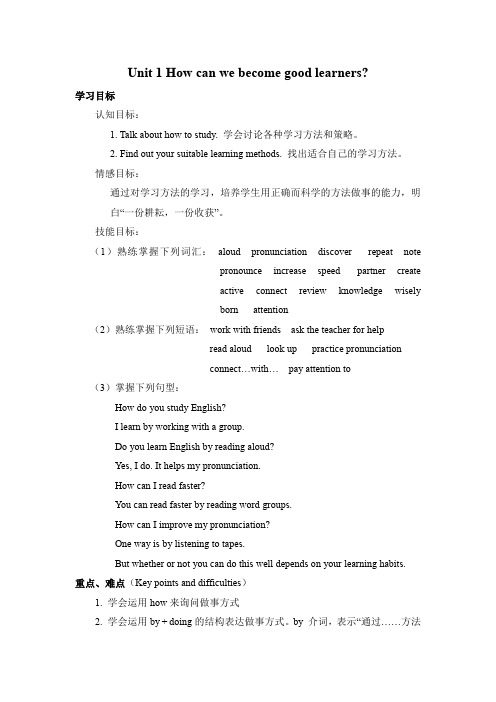
Unit 1 How can we become good learners?学习目标认知目标:1. Talk about how to study. 学会讨论各种学习方法和策略。
2. Find out your suitable learning methods. 找出适合自己的学习方法。
情感目标:通过对学习方法的学习,培养学生用正确而科学的方法做事的能力,明白“一份耕耘,一份收获”。
技能目标:(1)熟练掌握下列词汇:aloud pronunciation discover repeat notepronounce increase speed partner createactive connect review knowledge wiselyborn attention(2)熟练掌握下列短语:work with friends ask the teacher for helpread aloud look up practice pronunciationconnect…with… pay attention to (3)掌握下列句型:How do you study English?I learn by working with a group.Do you learn English by reading aloud?Yes, I do. It helps my pronunciation.How can I read faster?You can read faster by reading word groups.How can I improve my pronunciation?One way is by listening to tapes.But whether or not you can do this well depends on your learning habits.重点、难点(Key points and difficulties)1. 学会运用how来询问做事方式2. 学会运用by + doing的结构表达做事方式。
人教版九年级英语 Unit 1、Unit 2 重要语法知识点总结
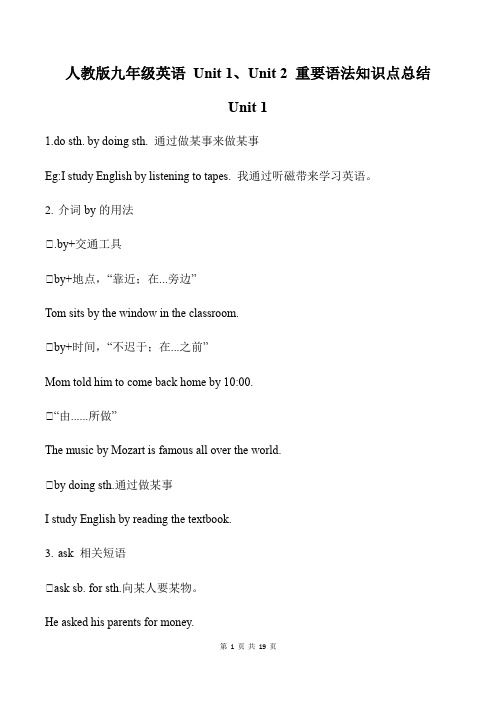
人教版九年级英语Unit 1、Unit 2 重要语法知识点总结Unit 11.do sth. by doing sth. 通过做某事来做某事Eg:I study English by listening to tapes. 我通过听磁带来学习英语。
2.介词by的用法①.by+交通工具①by+地点,“靠近;在...旁边”Tom sits by the window in the classroom.①by+时间,“不迟于;在...之前”Mom told him to come back home by 10:00.①“由......所做”The music by Mozart is famous all over the world.①by doing sth.通过做某事I study English by reading the textbook.3.ask 相关短语①ask sb. for sth.向某人要某物。
He asked his parents for money.①ask sb. about sth.向某人询问某事Can I ask about the result of the match?我可以问一下比赛的结果吗?①ask sb.(not) to do sth.要求某人(不)做某事(被动语态)--be asked (not) to do sth.被要求(不)做某事My mother asked me not to play in the street.4.have conversations with friends in English和朋友用英语交谈5.speaking skills 口语技能spoken English 英语口语6.read aloud 朗读 a little nervous 有点儿紧张7.It’s +adj.+(for sb.)+to do sth.做某事对某人来说是怎么样的。
九年级下册英语知识点
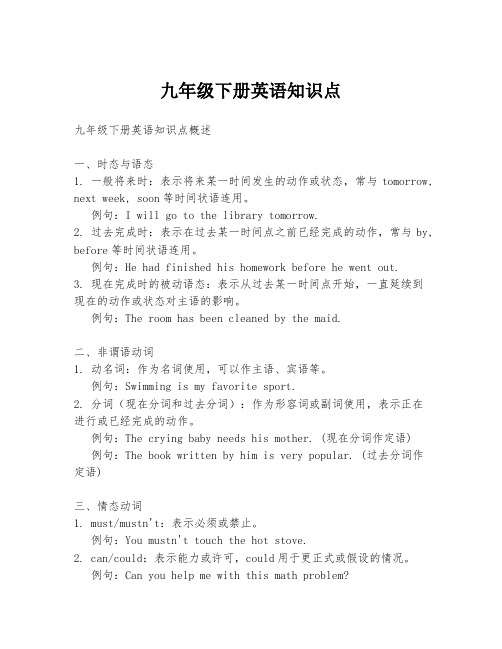
九年级下册英语知识点九年级下册英语知识点概述一、时态与语态1. 一般将来时:表示将来某一时间发生的动作或状态,常与tomorrow, next week, soon等时间状语连用。
例句:I will go to the library tomorrow.2. 过去完成时:表示在过去某一时间点之前已经完成的动作,常与by, before等时间状语连用。
例句:He had finished his homework before he went out.3. 现在完成时的被动语态:表示从过去某一时间点开始,一直延续到现在的动作或状态对主语的影响。
例句:The room has been cleaned by the maid.二、非谓语动词1. 动名词:作为名词使用,可以作主语、宾语等。
例句:Swimming is my favorite sport.2. 分词(现在分词和过去分词):作为形容词或副词使用,表示正在进行或已经完成的动作。
例句:The crying baby needs his mother. (现在分词作定语)例句:The book written by him is very popular. (过去分词作定语)三、情态动词1. must/mustn't:表示必须或禁止。
例句:You mustn't touch the hot stove.2. can/could:表示能力或许可,could用于更正式或假设的情况。
例句:Can you help me with this math problem?3. may/might:表示可能性或许可,might可能性更低。
例句:You may go out after finishing your homework.四、宾语从句1. 陈述句式宾语从句:用于主句之后,作为宾语,连接词用that。
例句:I believe that he is honest.2. 一般疑问句式宾语从句:用于主句之后,作为宾语,连接词用if/whether。
英语人教版九年级全册初三年级下册英语语法知识点
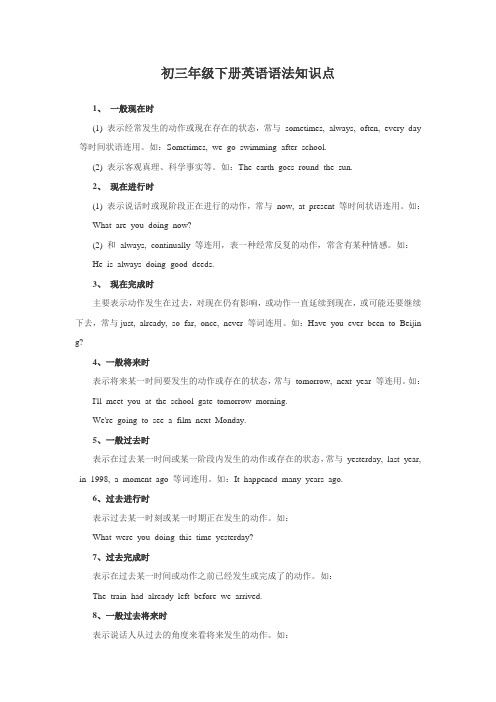
初三年级下册英语语法知识点1、一般现在时(1) 表示经常发生的动作或现在存在的状态,常与sometimes, always, often, every day 等时间状语连用。
如:Sometimes, we go swimming after school.(2) 表示客观真理、科学事实等。
如:The earth goes round the sun.2、现在进行时(1) 表示说话时或现阶段正在进行的动作,常与now, at present 等时间状语连用。
如:What are you doing now?(2) 和always, continually 等连用,表一种经常反复的动作,常含有某种情感。
如:He is always doing good deeds.3、现在完成时主要表示动作发生在过去,对现在仍有影响,或动作一直延续到现在,或可能还要继续下去,常与just, already, so far, once, never 等词连用。
如:Have you ever been to Beijin g?4、一般将来时表示将来某一时间要发生的动作或存在的状态,常与tomorrow, next year 等连用。
如:I'll meet you at the school gate tomorrow morning.We're going to see a film next Monday.5、一般过去时表示在过去某一时间或某一阶段内发生的动作或存在的状态,常与yesterday, last year, in 1998, a moment ago 等词连用。
如:It happened many years ago.6、过去进行时表示过去某一时刻或某一时期正在发生的动作。
如:What were you doing this time yesterday?7、过去完成时表示在过去某一时间或动作之前已经发生或完成了的动作。
初三下册英语知识点
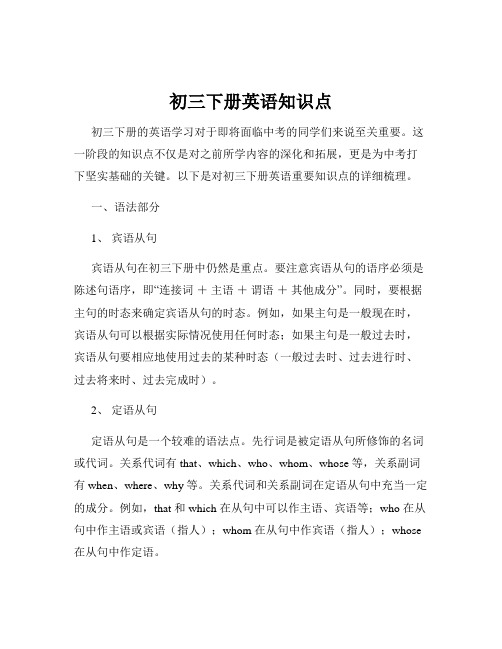
初三下册英语知识点初三下册的英语学习对于即将面临中考的同学们来说至关重要。
这一阶段的知识点不仅是对之前所学内容的深化和拓展,更是为中考打下坚实基础的关键。
以下是对初三下册英语重要知识点的详细梳理。
一、语法部分1、宾语从句宾语从句在初三下册中仍然是重点。
要注意宾语从句的语序必须是陈述句语序,即“连接词+主语+谓语+其他成分”。
同时,要根据主句的时态来确定宾语从句的时态。
例如,如果主句是一般现在时,宾语从句可以根据实际情况使用任何时态;如果主句是一般过去时,宾语从句要相应地使用过去的某种时态(一般过去时、过去进行时、过去将来时、过去完成时)。
2、定语从句定语从句是一个较难的语法点。
先行词是被定语从句所修饰的名词或代词。
关系代词有 that、which、who、whom、whose 等,关系副词有 when、where、why 等。
关系代词和关系副词在定语从句中充当一定的成分。
例如,that 和 which 在从句中可以作主语、宾语等;who 在从句中作主语或宾语(指人);whom 在从句中作宾语(指人);whose 在从句中作定语。
3、时态(1)现在完成时:表示过去发生的动作对现在造成的影响或结果,或者从过去开始一直持续到现在的动作或状态。
其构成是“have/has +过去分词”。
常与 already、yet、ever、never、for +时间段、since +时间点等连用。
(2)过去完成时:表示过去某一时间或动作之前已经发生或完成了的动作,即“过去的过去”。
其构成是“had +过去分词”。
常与 by the time、before 等引导的时间状语从句连用。
4、被动语态被动语态的构成是“be +及物动词的过去分词”。
要注意各种时态下被动语态的构成形式,如一般现在时的被动语态是“am/is/are +过去分词”,一般过去时的被动语态是“was/were +过去分词”,一般将来时的被动语态是“will be +过去分词”,现在进行时的被动语态是“am/is/are being +过去分词”等。
- 1、下载文档前请自行甄别文档内容的完整性,平台不提供额外的编辑、内容补充、找答案等附加服务。
- 2、"仅部分预览"的文档,不可在线预览部分如存在完整性等问题,可反馈申请退款(可完整预览的文档不适用该条件!)。
- 3、如文档侵犯您的权益,请联系客服反馈,我们会尽快为您处理(人工客服工作时间:9:00-18:30)。
人教版英语九年级下册语法 1冠词a/an/the/x的辨析1. 不定冠词(1) 不定冠词有两个:a和an。
a用于以辅音音素开头的单词之前,an用于以元音音素开头的单词之前。
当形容词修饰名词时,冠词要放在形容词的前面,这时用a或an取决于这个形容词的读音。
(2) 不定冠词的用法:①用于第一次提到的、不确定的人或物(可数名词)之前;②用于重量或时间等表示单位的名词前面,是“每……”的意思;③表示职业、身份;④用于数字hundred, thousand, million、量词之前;⑤用于一些固定词组中,如:have a rest 休息;make a living 谋生。
例:I read a book every month.我每个月读一本书。
An apple a day keeps the doctor away.每天一个苹果,医生远离我。
注意:有些单词虽然以元音字母开头,但是前面用不定冠词a,如university (大学)。
这是因为u在此发[ ju: ],以辅音音素开头用a。
同样,有些单词虽然以辅音字母开头,但是前面用不定冠词an,如hour。
这是因为h在此不发音,ou发[a?]的音,以元音音素开头用an。
2. 定冠词the(1) 一般用法:①用于第二次谈到的人或物。
②用于双方共知的人或物。
③“the + n.单数”可以表示一类人或物。
例:The telephone was invented by Bell.电话是由Bell发明的。
④指世界上独一无二的事物。
(2) 特殊用法:定冠词常用于一些特定词的前面。
助记:沙漠、河流与群山;列岛、海峡与海湾;阶级、党派、国家名;组织、团体和机关;方位、朝代、独一词;会议、文件及报刊;乐器、建筑、海洋群;定冠词帽戴在前。
①用于姓氏复数之前表示夫妇或全家人。
②“the + adj.”表示一类人或物。
如:the young 年轻人。
③用于一些固定词组中:in the evening在晚上;at the time在那时;go to the movies去看电影。
3.零冠词的情况:下列情况应免冠词:代词限定名词前,专有名词不可数;学科球类三餐饭,复数名词表泛指;两节星期月份前,颜色语种和国名;称呼习语及头衔。
①在一些专有名词(人名、地名、月份、西方传统节日等)之前,不用冠词;②名词前有形容词性物主代词修饰的时候,不用冠词;③在表示三餐、球类、棋类和游戏等名词前,一般不用冠词;④在物质名词和抽象名词前,一般不用冠词。
可数名词与不可数名词的常见用法辨析可数名词与不可数名词的综合考点辨析【用法讲解】可数名词与不可数名词一.可数名词(1) 定义:普通名词所表示的人或事物,可以按个数计算的叫可数名词。
(2) 分类:A. 个体名词:表示某类人或事物中的个体,如worker, farmer, desk, factory 等。
B. 集体名词:表示作为一个整体来看的一群人或一些事物,如people,family 等。
(3) 名词由单数形式变为复数形式的规则如下:①一般情况,加-s。
例:books, dogs, days, trees等。
②单词以s, x, ch, sh结尾的,加-es例:classes, watches ,boxes, brushes等。
③单词以“辅音字母+y”结尾,去掉y,加-ies例:stories, cities, families, babies等。
④以o结尾有生命的名词加-es;无生命的名词加-s。
例:有生命:heroes, potatoes, tomatoes, mangoes等。
无生命:photos, pianos, radios, zoos等。
⑤一些以f或fe结尾的单词,把f、fe变成-ve加-s。
例:life-lives, knife-knives等。
⑥不规则变化例:man-men, woman-women, child-children, foot-feet, tooth-teeth等。
⑦单复数同形例:deer, sheep, fish, Chinese, Japanese等。
二.不可数名词:(1) 定义:普通名词所表示的事物,不能按个数来计算的名词就叫不可数名词。
(2) 分类:A. 物质名词:表示无法分为个体的物质,如meat, rice, water, milk等。
B. 抽象名词:表示动作、状态、情况、品质等抽象概念,如work, homework, time, health, friendship等。
(3) 不可数名词归类:1. 液体类名词:water, juice, milk, lemonade, coffee, coke, ink等。
2. 自然现象类名词:snow, rain, ice等。
3. 食品类名词:rice, jam, honey, meat, bread, mutton, beef, pork, chicken, fish等。
4. 其它类名词:information (信息), news, homework, housework等。
三.可数名词与不可数名词的限定词:(1) 只能与单数名词搭配的限定词a(n),one,another,each,every,either,neither,many a,such a 等只能与单数名词搭配。
(2) 只能与复数名词搭配的限定词both,two,three,another two / three,many,(a) few,several,these,those,a (great) number of等只能与复数名词搭配。
(3) 只能与不可数名词搭配的限定词a (little) bit of,a great amount of,a great deal of,(a) little,much 等只能与不可数名词搭配。
补充:表示不可数名词的数量可用“不定冠词/基数词+量词+of+不可数名词”结构。
表达不可数名词量的复数概念,只需把量词变为复数。
如:a piece of paper→two pieces of papera cup of coffee→three cups of coffee(4) 能与复数名词和不可数名词搭配的限定词a lot of,lots of,enough,more,most,such,plenty of,quantities of等可与复数名词和不可数名词搭配。
注意:可数名词单数或不可数名词作主语,谓语动词用单数;可数名词复数作主语,谓语动词用复数。
加's、s'和“of+名词”构成的名词所有格。
名词所有格表示所属关系,在句中作定语、表语、宾语或主语。
其构成方法如下:一、表示人或其他有生命的东西的名词常在词尾加“'s”。
如:Li Ping's father my sister's book二、在以s结尾的名词(包括以s结尾的复数名词)后面,只加“'”。
如:Teachers' Day the boys' game如果复数名词不是以s结尾的,末尾也要加's。
如:Women's Day Children's Day三、有些表示时间、距离以及世界、国家、城镇等无生命的名词,也可在词尾加“'s”。
如:today's newspaper ten minutes' break四、表示无生命东西的名词,一般可用介词of构成短语来表示所有关系。
如:the door of the room the top of this page注意:'s还可以表示某人的家或者某个店铺,如:my aunt's(我阿姨家),the doctor's(诊所)等。
五、of也可以用于有生命的名词,如:the name of the boy反身代词、人称代词和物主代词的考点辨析一、人称代词1. 人称代词形式:2. 人称代词用法:We are the best. 我们是最棒的。
(作主语)He is my teacher. 他是我的老师。
(作主语)Please give us more time to finish it. 请给我们更多的时间来完成它。
(作宾语)3. 人称代词的语序:当几个人称代词并列充当主语时,单数形式(二、三、一),如:You, he and I 复数形式(一、二、三),如:We, you and they第三人称男女两性并用时,男先女后,如:He and she二、反身代词1. 反身代词的定义:表示“我(们)自己”、“你(们)自己”、“他/她/它(们)自己”的代词称为反身代词。
在句中作宾语、同位语、表语等。
如:I'm not myself today. 我今天不在状态。
(作表语)I myself made a mistake. 我自己犯了一个错误。
(作I 的同位语)2. 反身代词的形式:3. 含反身代词的常见搭配1) by oneself 靠自己,独自。
如:I clean the classroom all by myself. 我全靠自己打扫了教室。
2) enjoy oneself 玩得愉快。
如:The children are enjoying themselves. 孩子们正玩得很愉快。
3) help oneself (to) 请自便。
如:Help yourself to some cakes, Jack. 请随便吃些蛋糕,Jack。
4) teach oneself 自学。
如:I teach myself English. 我自学英语。
三、物主代词物主代词可分为形容词性物主代词和名词性物主代词。
形容词性物主代词后需加名词;名词性物主代词是在物体已经指出的情况下用来代替已知物体的物主代词,后面不需要加上名词。
1. 物主代词的形式:2. 名词性物主代词的用法:名词性物主代词可作主语、宾语、表语等。
如:His watch is purple. Mine is black. 他的手表是紫色的。
我的是黑色的。
(mine作主语)Tom's bike is broken. He is using mine. Tom的自行车坏了。
他现在在用我的。
(mine作动词宾语)My views are similar to yours. 我的观点与你的相似。
(yours作介词宾语)This computer is his. 这台电脑是他的。
(his作表语)名词性物主代词=形容词性物主代词+名词。
This is my notebook.=This notebook is mine. 这是我的笔记本。
the other/other/another/others/the others1.other可作形容词或代词,作形容词时,意思是“别的,其他”,泛指“其他的(人或物)”。
